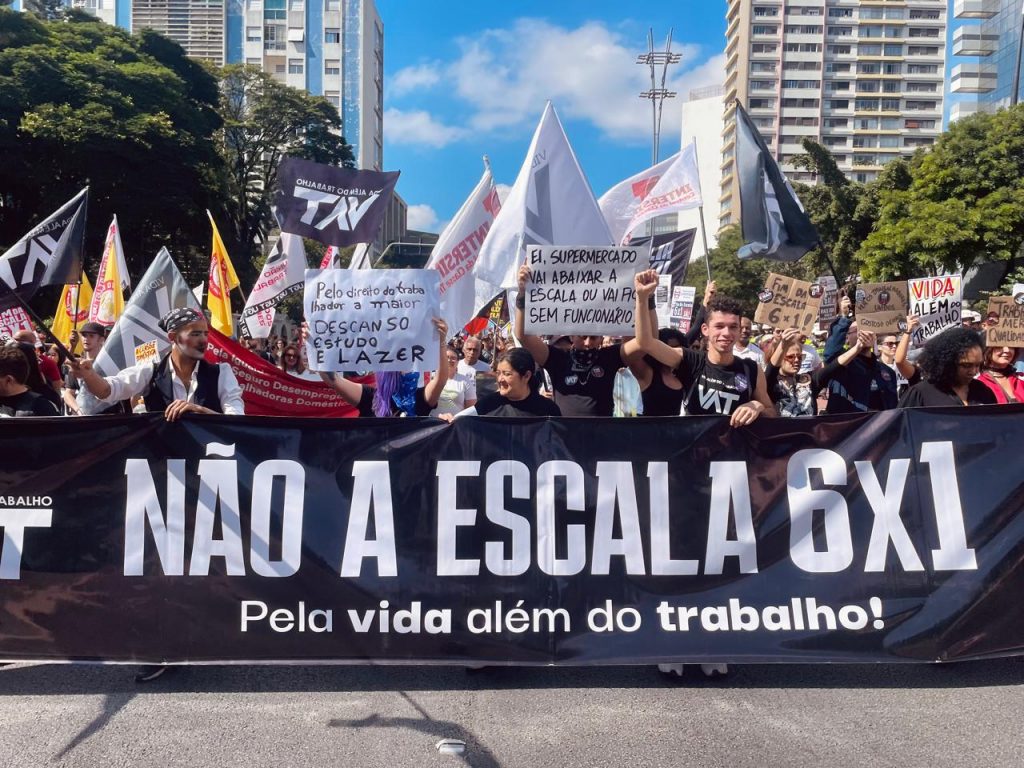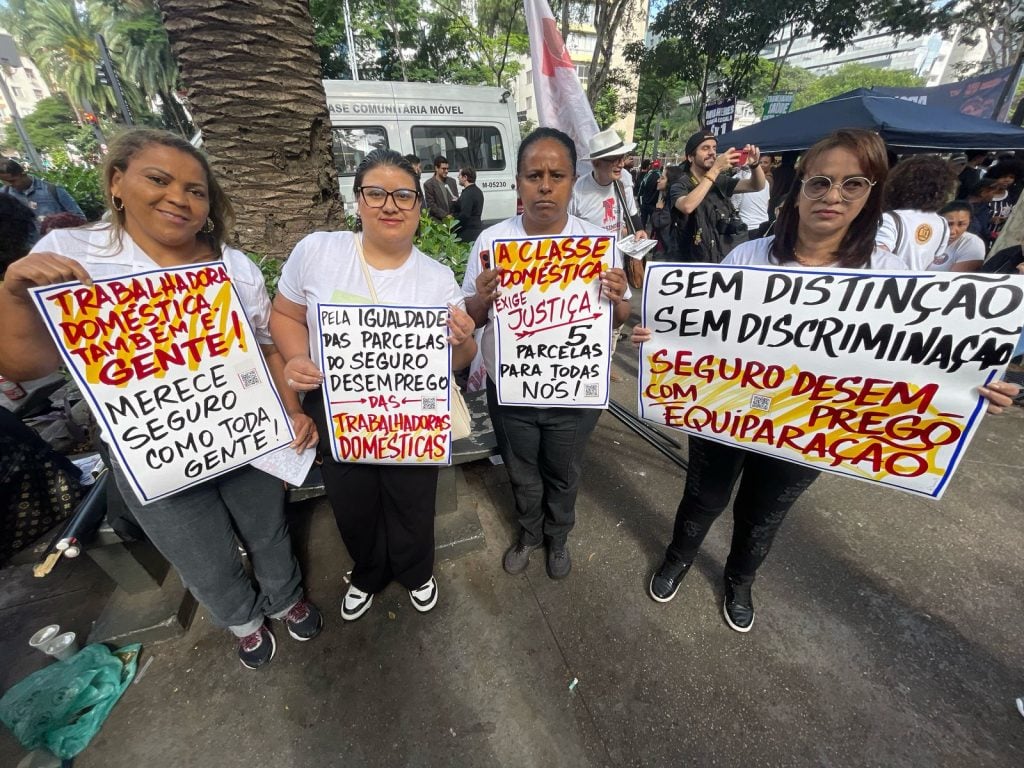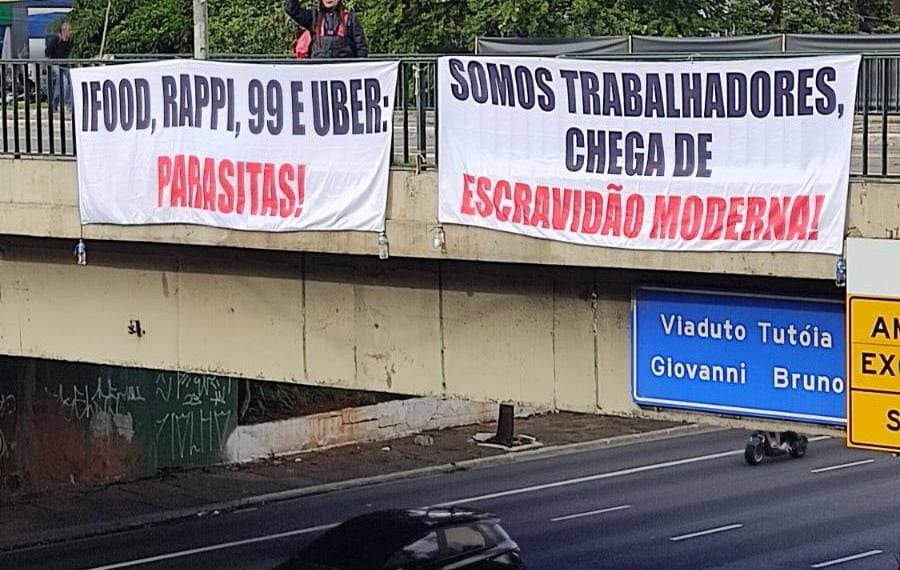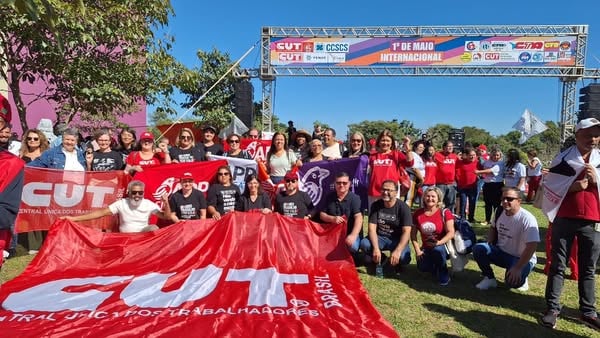Workers’ Day saw demonstrations for better working conditions across Brazil. Since early Thursday morning, trade unions and people’s movements held demonstrations in different cities.
During the morning, there were demonstrations in the city of Maceió, at Pajuçara Beach; in Salvador, at Barra Lighthouse; in Teresina, at Estaiada Bridge; in Natal, at Alberto Maranhão Theater; in Aracaju, in the Santa Maria neighborhood; in Belém, at Operário Square; and in Belo Horizonte, at September 7th Square.
Read below the details of the demonstrations across the country:
São Paulo
In the city of São Paulo, demonstrators gathered at Oswaldo Cruz Square for a demonstration against the 6-day workweek, called by the Life Beyond Work (VAT, in Portuguese) movement. The demonstration headed toward Paulista Avenue.
Priscila Santos Araújo, VAT coordinator in São Paulo, said the 6-day workweek doesn’t allow workers to be humans. “It takes us away from our family, from our faith. It doesn’t allow us to have health, to have dreams… To have the minimum [to live],” she said. “It’s slavery.”

President Luiz Inácio Lula da Silva (Workers’ Party) defended the end of the 6-day workweek in a national address on Wednesday (30). Former federal deputy José Genoino (Workers’ Party), who took part in the mobilization on Thursday morning, reinforced the importance of the issue, as well as emphasized the need for extending the income tax exemption. “We have to be on the streets to pressure Congress for these agendas,” he said.
In addition to VAT, the movement of domestic workers, representatives of street vendors, politicians and others took part in the act on Paulista Avenue.

In the Sé Square, another demonstration called for a reduction in working hours, incentivizing workers to unite for this agenda and others.
Also in São Paulo, delivery workers who work for app companies hung protest banners on the Tutóia Viaduct in Vila Mariana. “We are workers! No more modern slavery,” read one banner. “iFood, Rappi, 99 and Uber: parasites!” added another.

At 10 a.m., demonstrations began in Campinas, Araraquara, Osasco, Jacareí and São Bernardo do Campo, in the state of São Paulo.
In the city of São Bernardo do Campo, thousands of people gathered for Workers’ Day. On the agenda, the reduction of working hours was unanimously endorsed by both the public and the trade unionists who spoke to the crowd.
For Adriana Donato, the most important issue facing the profession is that of working hours. “I’ve been working in the health sector for 20 years, waiting for the hours to be reduced. I’m almost retired,” says Adriana, who works 12 hours and then rests for 36 hours. After so long, she says she feels the weight of the years. “My health, my back, taking medication for a few hours…” she said, as she was interrupted by her daughter. “She hardly ever saw me,” said 11-year-old Milena.
The public enjoyed the holiday with music presentations by Tiee, MC Hariel, Pixote and Belo.
Paraná
In Foz do Iguaçu, the Central Workers’ Union (CUT, in Portuguese) of Paraná state and other unions began an international act in favor of workers. The demonstration took place in the region of the triple border between Brazil, Argentina and Paraguay. The gathering began on the campus of the Federal University of Latin American Integration (Unila). It brought together representatives of Brazilian workers and workers from countries of the so-called Southern Cone.
“It was a great event that fulfilled its aim. Once again, we were able to see that our problems are similar and that’s why we need to discuss, debate and come up with joint solutions that expand integration between our countries and the working class. We will continue adjusting our actions in partnership so that we can expand the unity of the Patria Grande!” said the president of CUT Paraná, Marcio Kieller.

Federal District
Also at 10 a.m., the central workers’ rally began in Brasilia, Brazil’s capital. The demonstration brought together workers from various categories, and featured cultural performances, food trucks and toys for children.
Brasília had already hosted the Working Class March on Tuesday (29), which had a plenary session on updating the working class agenda. Among the main demands were an end to the 6-day workweek and exemption from income tax for those earning up to 5,000 reais (US$ 884). The workers walked towards the National Congress and handed over their agenda to representatives of the three branches of government.
Rio de Janeiro
In Rio de Janeiro, the unified protest of Workers’ Day occupied Cinelândia square, the historic stage for social struggles in the city center. The slogan ‘life above capital’ dominated the demonstration, which called for a reduction in working hours.
Marcelo Rodrigues, from the National Executive of the Central Workers’ Union, said that May 1st is a date that carries the memory of the working class struggles and the victories that took place on the streets, in protests and marches. For the union leader, the youth present at the event showed the way to a fairer society.
“In recent times, the far right has been trying to take away our rights, but we continue to fight and move forward. We are now fighting for those who earn up to US$ 884 not to pay income tax, for a reduction in workers’ working hours, and for an end to the 6-day workweek. May 1st says this to us: we are going to celebrate our achievements, our history, our memory and we are going to organize ourselves for future struggles. We are interested in life, not in capital,” he told Brasil de Fato.
Bahia
In Salvador, Bahia’s capital, workers gathered early in the morning in the Barra Lighthouse area. Many took part in Treinão do Trabalhador, a physical exercise session promoted by trade union centers.
At the event, leaders called for an exemption from income tax and a drop in the national economy’s basic interest rate, known as SELIC. The state’s deputy governor, Geraldo Junior, attended the event and celebrated the workers’ meeting. “There’s a special symbolism here. It’s a moment to thank workers for their spirit of struggle and resistance for their rights,” he said at the event.
“The exemption from income tax of up to US$ 884 is fundamental to Brazil’s growth. It will make it possible to put more food on the table, allowing workers to save money, which will certainly make it possible for our country to develop even more,” said Leninha Valente, state president of the Central Workers’ Union (CUT-BA, in Portuguese).

In Bahia’s second largest city, Feira de Santana, the Bloco da Trabalhadora e do Trabalhador took to the streets at 4 p.m., with a gathering at the Amélio Amorim Culture Center. The activity is part of the city’s Micareta program and the main attraction was the band Araketu.
Mato Grosso do Sul
Workers joined rural movements in a demonstration at the headquarters of the National Institute for Colonization and Agrarian Reform (Incra, in Portuguese) on Thursday. The demonstration aimed to defend the agrarian reform agenda.
According to the Landless Rural Workers’ Movement (MST, in Portuguese), more than 15,000 families are encamped in the south of Mato Grosso do Sul state awaiting permanent settlement.
The demonstration at Incra’s headquarters marked the start of Workers’ Day activities in the state, with a special focus on the struggle for land. In recent weeks, several protests have taken over the region.
Alagoas
In Maceió, the protest at Pajuçara Beach brought together workers from the countryside and urban areas. Luciano Santos, president of CUT Alagoas, said the demonstration was to demand working improvements. He said that the working class is going through difficult times, with job insecurity and wage cuts. Santos also called for a reduction in working hours.
Piauí
In the city of Teresina, trade unions, social, popular and student movements demonstrated on the Estaiada Bridge. The demonstration was in defense of a reduction in the working load; an end to the 6-day workweek; exemption from income tax; and the arrest of former President Jair Bolsonaro for the attempted coup on January 8, 2023.
Rio Grande do Sul
In Porto Alegre, unions held a Workers’ Day party at Gaúcho House. At the concert by the band Produto Nacional, lead singer Paulo Dionísio recalled that “workers are the strength of Brazil”. Saxophonist Jorge Cidade called for an end to racial prejudice and prejudice against people living in impoverished nighborhoods.
In the state, protests also took place in the towns of Caxias do Sul, Passo Fundo, Pelotas and Tramandaí.
Ceará
In Fortaleza, a workers’ demonstration was held in Portugal Square. CUT and other trade unions called for a reduction in working hours without a reduction in wages, an end to the 6-day workweek, exemption from income tax for those earning up to US$ 884 per month, taxing the super-rich and punishing coup plotters.
Santa Catarina
In Greater Florianópolis, a large coalition of unions and central offices organized a rally on the waterfront in São José, with poetry, a presentation of traditional dances, theater and music. The event brought together workers from public and private services, and addressed issues such as reducing working hours, the fight against the privatization of state-owned companies and mental health at work.




